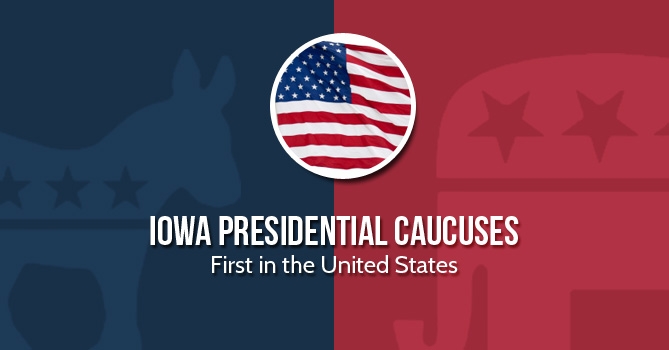The race to the US Presidency has become a lot more exciting as the US Presidential nomination process gets off to a start with the Iowa Caucus to be held today. The days following the Iowa Caucus would see caucuses and primaries being held in all the 50 states of the United States of America. Some of the states where caucuses would be held include Iowa, Hawaii, Nevada, Wyoming, Colorado, Kansas, North Dakota, Alaska, Maine and Minnesota. The rest would organize primaries. Let us take a look at what caucuses and primaries are, and how pivotal is the Iowa Caucus to the US Presidential campaign.
What is a caucus?
In a caucus or a primary, every state in the country is provided a chance to vote for the candidate or party of its choice in order to elect a Presidential nominee for the major parties; however, both the system are different from each other.
A caucus is financed as well as organized by the political parties and not by the state. The parties decide the location, date and time of the meeting. People then gather at the said location to cast their votes. The caucus is organized in a private area and any voter who is registered for the party is eligible to attend. This system does not require a secret ballot asit is transparent. The discussions and debates at the caucus can span many hours after which people select their choice by a show of hands.
Caucuses are usually held in school gymnasiums, community centers, libraries and churches.
Primary elections
Primary elections are different from the caucuses as they are run by the state government and the process is very similar to the general elections. This system involves a process wherein the registered voters of a particular state participate to elect the candidate of the state parties and the voting is done through a secret ballot.
There are two types of primaries – closed and open. A closed primary has limited options as here the registered voter is eligible to participate in the primary that has been organized by that specific party. However, the open primary has much more options as here the registered voter, regardless of his party membership, can vote in either of the primaries that are organized by the parties. The secret ballot is what makes the caucus different from the primaries as in a caucus the representatives of the party are present and also try to influence the voters who are still not decided whom to go for.
What is it that sets Iowa Caucus apart from the others?
Iowa is a small state yet the media attention that the Iowa Caucus garners is unmatched. This is one of the most hyped caucus and the factor that makes it a big and influential event is that it has always been the first state ballot which kick starts the electoral process. The caucus witnesses residents of the state gathering in the caucuses of Iowa’s 1,681 precincts and electing delegates to the corresponding country conventions. As it is the first caucus of the presidential elections, the state has the power to narrow down the level playing field. The Iowa, followed by the New Hampshire Caucus, are important for if a candidate does not do well in these two early states, support for him or her would eventually begin to dry up. The figures speak for themselves.
In the 2008 US Presidential elections, Barack Obama was not a prominent figure. But the Iowa Caucus changed his reputation from an underdog to a front-runner. He beat Hillary Clinton, the other opponent, setting the momentum that ultimately resulted in him bagging the Democratic candidacy and finally the presidency of the country.
Jimmy Carter in 1976 won the most votes of any candidate in Iowa. He used this achievement to boost his campaign as he headed to the next stop – New Hampshire. He won New Hampshire, captured the Democratic Party nomination and ultimately became the President of the country.
In the Iowa Caucus, voters all over the country get to witness the actual support their candidates have. Apart from this, a major chunk of the media and donor attention is also determined in Iowa.
Iowa Caucuses: Clinton and Cruz emerge winners
The first state to hold the caucus did spring some surprises. The outspoken Republican candidate Donald Trump was beaten by Ted Cruz, with Marco Rubio following close behind. The final results showed that Ted Cruz has secured 28 percent of the GOP support, Trump 24 percent and Rubio 23 percent.
Meanwhile, the contest between the Democratic candidates was the closest in state party caucus history. Hillary Clinton claimed victory over Bernie Sanders by a razor thin margin. While Clinton had 49.9 percent of the delegates, Sanders fell short of just 0.3 percent at 49.6 percent.
With the Iowa Caucuses over, attention has now shifted to New Hampshire where the primaries will be held on February 9.
Read More
Who will be the next U.S. President?
New Hampshire results give momentum to US Presidential polls
US Presidential Election 2016 Facts
Survival of fittest: US presidential campaign 2016

